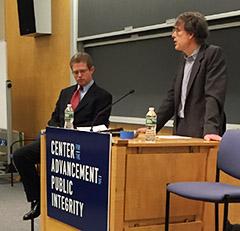The Water Crisis Next Door
New York, April 5, 2016—The depth of corruption in a Newark water agency was “astonishing, even by New Jersey standards,” according to former New Jersey State Comptroller Matthew Boxer ’95, who discussed the unraveling of a multimillion-dollar kickback scheme at the now-bankrupt Newark Watershed Conservation and Development Corporation (NWCDC) in a March 23 event sponsored by Columbia Law School’s Center for the Advancement of Public Integrity.
| Matthew Boxer '96 (left) and Brendan O'Flaherty discuss local issues and global consequences. |
Boxer was joined by Columbia University economics professor Brendan O’Flaherty, a former finance director for the City of Newark. Since 2010, O’Flaherty has served as an adviser to the Newark Water Group, a collection of citizen activists who first noticed the agency overseeing water reservoirs for Newark and its surrounding suburbs had been turned into a cash cow for crooked officials. A subsequent investigation by Boxer’s office substantiated the group’s claims and uncovered further conflicts of interest, nepotism, and the payment of improper bonuses.

